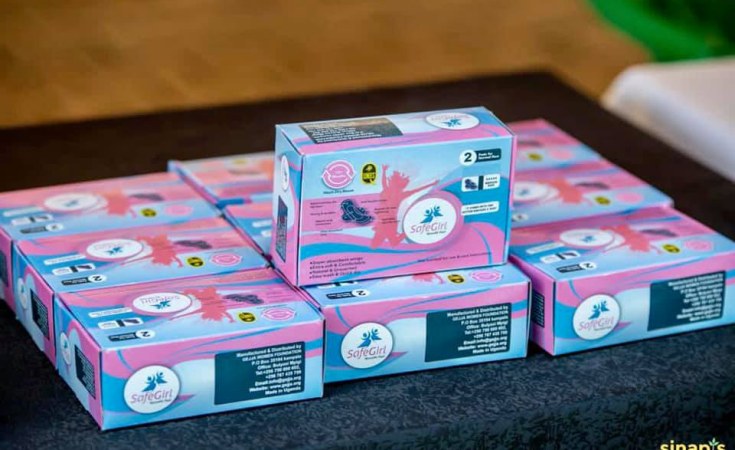Although menstruation is a natural process signalling a girl's puberty, discriminatory practices shrouded in heinous associated stigma and cultural taboos and lack of access to correct information still prevail.
In many, especially rural areas in Uganda, adolescent girls face significant challenges to managing menstruation hygienically and with safety, dignity, and confidence.
ADVERTISEMENT
All these are compounded by existential lack of proper toilets and sanitation facilities which make girls' menstruation undignified and traumatic process.
To escape mockery and stereotypes occasioned by their peers in schools, girls resort to keep out-of-school to deal with menstruation which negatively affect their learning outcome(s).
ADVERTISEMENT
UNESCO reports, 1 out of 10 girls in Africa, miss school during their menstruation and eventually drop out. In Uganda, the price of disposable sanitary pads ranges between Shs 3,700 ($1) and Shs 7,000 ($1.9) yet available statistics show that 41% of people live below the poverty threshold of $1.90 per day.
High cost of sanitary pads has made them inaccessible for poor girls. In some instances, girls have faced sexual abuses in their quest for money to buy essential sanitary pads yet others are compelled to use unhygienic options; dirty rags, old clothes or dried leaves to contain blood flow, posing health risks.
The aforementioned issues altogether, demonstrate that menstruation which is compulsory for all girls, is instead turned into a dream-killer for most girls as stigma and cultural taboos block girls' effort to access fundamental right to education-also an enabler for sustainable development.
To salvage the situation which has been exacerbated by biting COVID-19 negative economic effects, LIDE Infinite Skills Africa (LIDEISA), launched a LIDEISA Pads Girls' Education For Global Goals (LIGEGG) Campaign whose main objective is to address menstrual hygiene management needs in schools.
LIDEISA traveled to Buyende district for a comprehensive menstrual education session through which girls over 88 girls at Bukose Junior School in Bugaya sub-county were given knowledge and skills about safe menstruation handling.
To tackle myths, misconceptions, misinformation, and negative cultural attitudes associated with menstruation often perpetrated by boys and male teachers, LIDEISA team also comprised of Sarah Bafumba, Diana Ssentongo and Lillian Alinda engaged and sensitised them with a view of urging them to "support girls instead of mocking them."
"Just as you see changes on your bodies when you reach puberty, you ought to know that menstruation is a normal thing to every girl at puberty," Deo Walusimbi, LIDEISA chief executive officer said, "as boys and teachers, you should always support them to safely handle periods as opposed to mocking them."
With internal support, LIDEISA donated 33 packs of LIDEISA reusable sanitary pads in a bid to directly facilitate girls' retention in school to complete education cycle without interruptions attributed to menstruation.
They also gave Nangoobi Fidah, who lives with sickle cell, a full bursary with all requirements for her studies catered for.
Walusimbi explained that LIDEISA, a not-for-profit development and education social enterprise that offers holistic hands-on skills education and leadership mentorship to all people with focus on young people without discrimination, is concerned with ugly trend that negatively impacts not only girls, but communities in the long-run.
"There are lot of challenges, but growing poverty levels among girls' parents and changing stakeholders' mindsets about the whole subject of menstrual hygiene management are the biggest, but we are determined to tackle them through strengthening girls' confidence and be proud of their menstrual cycle without shame," Walusimbi said.
He said LIGEGG campaign goals are to see increased girls' retention and concentration in school activities; reduced diseases from unhygienic menstrual practices among girls, curbed spread of menstruation associated taboos and myths-including restriction from social activities, and reduced sexual abuses among poor school girls in search for money to buy sanitary pads.
Other goals are; increased knowledge on menstrual hygiene management among the younger generation, who would serve as change agents in their communities and facilitation of achievement of sustainable development goals.
Tibagalika Mustafa, the school director, appreciated LIDEISA for "menstrual education session and LIDIESA Pads' donation because it has enlightened us, school administrators, teachers, boys and girls. The gained knowledge will enable us to become effective girls' supporters and believe, pads' donations will help in reducing girls' absenteeism during periods which has been rampant."
Nabirye Shadia (P.5), who was among pads' recipients, said that her parents could not "afford buying me pads every month, but I am overjoyed that I now have these ones I can reuse from LIDEISA Pads and I think. I will have no reason to stay at home and miss lessons at school because of lack of sanitary pads to handle monthly periods."


